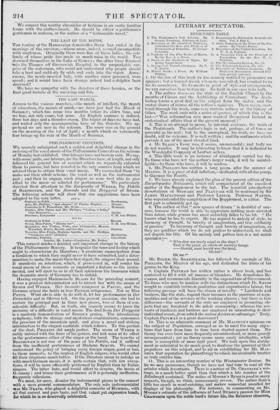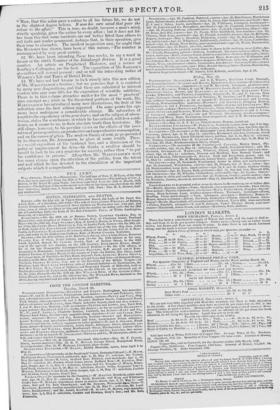LITERARY SPECTATOR.
REVIEWER'S TABLE,
George Tompson, Attorneymt.Law, don. Vol. I. Part I.
Coventry. \V. R. A. Pettman.
4. Essay on the Doctrine of Types. By Malthus.
By the Be;'. J. J. Blunt. Population. By the Rev. T. It.
1. OF the law of this book we are scarcely entitled to pronounce an opinion ; but a learned friend, whom we consulted, has vouched to us for its soundness. To its merits in point of 'style and arrangement, we can ourselves bear testimony. Its fault in our eyes is its bulk. 2. The author discusses the state of the English Church by the mouths of Cicero and the Archbishop of Canterbury. The Arch- bishop learns a great deal on the subject from the orator, and the orator shares of course all the author's opinions. There occur, scat- tered through the work, some very curious notices of the histoiy of tithes. The work ends with a series of queries, of which this is the last—" Was reformation ever more wanted throughout Ireland in ecclesiastical affairs than at the present moment ? "
3. This is an attempt to prove, by internal evidence, the truth of the Pentateuch. The author's logic is not, perhaps, at all times so powerful as his zeal ; but to the unsceptical, his work; we have no doubt, will be welcome. It is well written ; and the sentiments which pervade it are of the most elevated kind.
4. Mr. SLADE'S Essay was, it seems, unsuccessful ; and truly we do not wonder. It may be interesting to know that it is dedicated to the Worshipful Company of Leather-sellers.
5. This little work is an instance of abridgment carried too far. To those who have not the author's larger work, it will be unintel- ligible—to those who have, it will be useless.
6. Mr, PHILLIPS has written a long poem, after the manner of MILTON. It is a piece of dull inflation,—dedicated, with all due pomp, to GEORGE the Fourth.
7. We have already explained the plan of the present edition of the Encyclopedia Britannica, which will comprehend all the excellent matter of the Supplement to the last. The beautiful introductory dissertations of STEWART and PLAYFAIR will be continued by Sir JAMES MACKINTOSH and Professor LESLIE. Professor NAPIER, who superintended the completion of the §upplement, is editor. The first part is admirably got up. 8. The author of this " new species of drama" is• doubtful of suc- cess, because the world is able to appreciate nothing more elevated than talent, while genius has most unluckily fallen to his lot. " He knows what he has to expect. He has aspired to melody of style, to harmony of thought, to brevity of imagination, and true sublimity of passion." To harmony of thought and brevity of imagination, as they are qualities which we do not profess to understand, we shall not dispute his title. Of his melody and pathos here is a not unfair
specimen :—
` "Who slew my lovely angel as she slept ?
That is the point on which all mystery hangs. —Horrid, most horrid was the deed, Oh !
Oh me t"
Mr. BUCKE, the SHAKSPEARE, has followed the example of Mr. PHILLIps, the MILTON of his age, and dedicated the fruits of his genius to the Kinn-
9. Captain PETTMAN has written rather a clever book, and has contrived to fill it with all manner of blunders. He demolishei Rr- CARDO, and recommends liberality in the expenditure of Government. To those who may be familiar with the distinctions which Dr. SMITH sought to establish between productive and unproductive labour, the following passage will have the charm of novelty. " Landlords and bankers, like the state, expend their incomes in the purchase of com- modities and of the services of the working classes ; but there is this difference—the servants of the state are employed in promoting ob- jects that are beneficial to the whole community; whereas the ser- vants of landlords and bankers are employed in ministering to their individual wants, from which the nation derives no advantage." Truly, Captain PETTMAN is a great discoverer !
10. This is an admirable summary of Mr. MALTHUS'S opinions on the subject of Population, arranged so as to meet the many objec- tions that have from time to time been started against them. No theory has ever been more frequently misunderstood, or more grossly misrepresented ; yet no theory seems more easily intelligible, while none is susceptible of more rigid proof. We look upon this abridg- ment as calculated to do much good, to disabuse the ignorant of their prejudices on this subject, and to aid in establishing for Mr. MAL- THUS that reputation for philanthropy to which his invaluable treatise so truly entitles him. 11. This is an interesting number of the Westminster Review. So far we may pronounce, though we have not had time to read all the articles which it contains. There is a notice of Dr. CHANNING'S wri- tings, in a much better spirit than that which a late number of the Edinburgh contained. The notice of MOORE'S Byron is good in many respects, though, we think, unnecessarily severe. The author deals a little too much in word-catching, and makes somewhat uncalled for displays of his philosophy. For instance, in commenting on Mr. Moorm's estimate of the influence of Lord BYRON'S passion for Miss CIIAWORTE upon the noble bard's future life, the Reviewer observes, "Now, that this affair gave a colour to all his future life, we do not in the slightest degree believe. R was Ms own mind that gave the colour to the (fain" This is true, no doubt, because a man's mind, strictly speaking, gives the colour to every affair; but it does not fol- low from this that some incidents are not better fitted than others to call !brill and render permanent., feelings that, in their operation, give their tone to character. The incident in question may, for aught that the Reviewer has shown, have been of this naturo.—The number is recommended by very great variety. 12. We have been intending, these two weeks, to say a word in favour of the 100th Number of the Edinburgh Review. It is a good number. An article on Prophetical Histories, and a review of Southey's Colloquies, are the best. The exposition of Mr. SAmEn's absordities will reward perusal ; and so will the interesting notice of WILSON'S Life and Times of Daniel Defoe.
13. We have not had leisure to look closely into this new edition of Mr. MACCULLOCH's treatise ; but we perceive that it is enriched by many new disquisitions, and that these are calculated to interest readers who may care little for the expoition of Scierli lilt! subtleties. There is in this volume attractive matter for the most " practical" man amongst us ; while in the theoretical portions of the work, Mr. MAccmocH has introduced many new illustrations, the fruit of his reflection since the first edition appeared. On some points his opi- nions have undergone a considerable change. He subscribes at length to the expediency of the poor-later; and on the subject of absen- teeism, states the conclusions at which he has arrived, with less confi-
dence, as it seems to us, in their absolute truth than heretofore. He still clings, however, to his peculiar views on the effects of the insti-
tution of pri titre, on productive and unproductive consumption, and on the cunses qf gluts. The modern theory of rent, as propounded by its discoverer, Dr. ANDERSON, he gives at some length. There
is a ueild exposition of the bankrupt law, and a discussion of the policy of imprisonment for deb—he thinks a creditor should be taught to look to his own prudence for security, rather than " to put his confidence in prisons." Altogether, Mr. lk.ffAccuLLocifs work has many claims upon the attention of the public, from the talent and zeal which he has devoted to the elucidation of the important subjects which it comprehends.



































 Previous page
Previous page